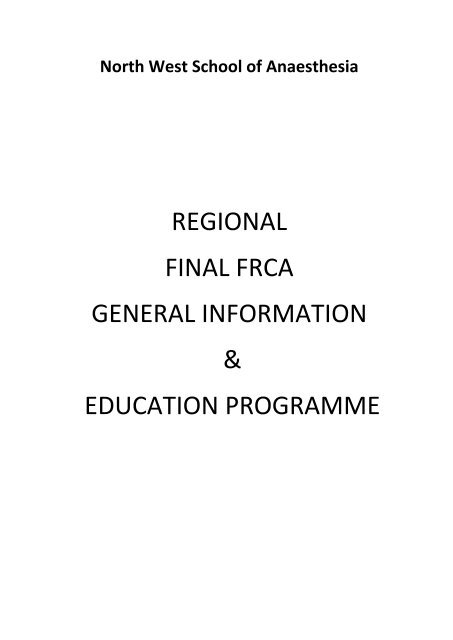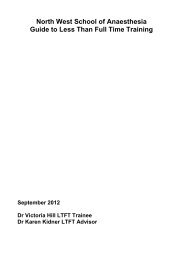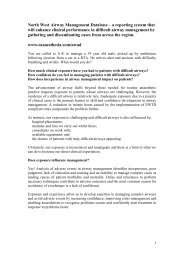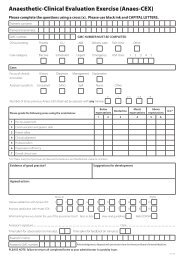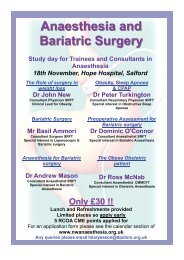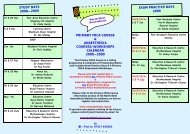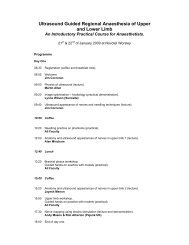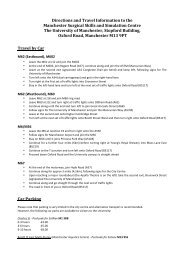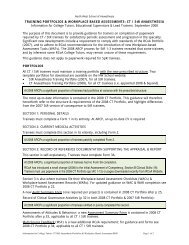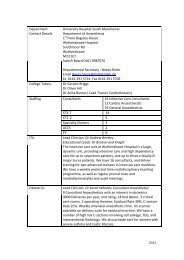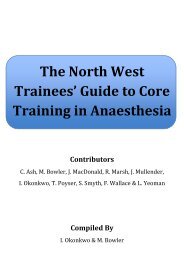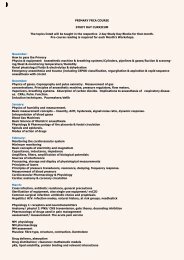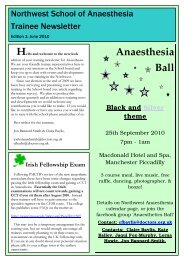regional final frca general information & education programme
regional final frca general information & education programme
regional final frca general information & education programme
You also want an ePaper? Increase the reach of your titles
YUMPU automatically turns print PDFs into web optimized ePapers that Google loves.
North West School of Anaesthesia<br />
REGIONAL<br />
FINAL FRCA<br />
GENERAL INFORMATION<br />
&<br />
EDUCATION PROGRAMME
REGIONAL FINAL FRCA<br />
GENERAL INFORMATION<br />
&<br />
EDUCATION PROGRAMME<br />
CONTENTS<br />
SECTION ONE:<br />
INTRODUCTION & GUIDANCE TO REGIONAL EDUCATION PROGRAMME<br />
SECTION TWO:<br />
REGIONAL STUDY DAYS CALENDARS:<br />
1. Neuro, Cardiac, Chronic Pain & Paediatrics<br />
2. ST3 Neuro /ITU Simulation Study Days<br />
SECTION THREE:<br />
TUTORIAL TERM PLAN<br />
SECTION FOUR:<br />
CENTRAL, NORTH & SOUTH SCHOOL TUTORIAL CALENDARS<br />
SECTION FIVE:<br />
CURRICULUM CHECKLIST
INTRODUCTION & GUIDANCE<br />
TO THE<br />
REGIONAL FINAL FRCA<br />
EDUCATION PROGRAMME<br />
S<br />
E<br />
C<br />
T<br />
I<br />
O<br />
N<br />
O<br />
N<br />
E
Final FRCA Tutorial Programme 2012-2013<br />
There have been a number of changes made to the Final FRCA Tutorial <strong>programme</strong> this year:<br />
The North, Central and South Schools will each run weekly tutorials which you will be expected to<br />
attend. Each school is running the same tutorial <strong>programme</strong>, divided into two terms, so that if you move<br />
Schools after six months, you should not have any repetition of subject matter. The tutorials will all be<br />
on Wednesday mornings, with North run at Preston, Central at Salford and South at Wythenshawe. The<br />
tutorials will be open to all ST3 and 4 who have yet to complete their Final FRCA, and also to the CT2s<br />
who have passed the Primary (negotiated with their Tutors).<br />
The first term runs from 5/9/12 until 30/1/13, and will cover Head & Neck, Airway, Orthopaedics,<br />
Regional, Vascular & Non-Theatre. The second term runs from 6/2/13 until 31/7/13 and will cover<br />
General topics, Obstetrics, Plastics & some common ICM topics.<br />
Specialist Study Days<br />
To try and ensure that teaching in the various sub-specialities is standardised across the region, it has<br />
been decided that we will run a number of Study Days, in Cardiac, Neuro, Chronic Pain and Paediatrics.<br />
These full day sessions will also take place on Wednesdays, and the usual <strong>final</strong> tutorial will be cancelled.<br />
You will be expected to book onto one Cardiac, Neuro and Chronic Pain day in a year. You should attend<br />
the one most relevant to your clinical modules in each six-month block (for example pain study in the 6<br />
months containing your pain module). Cardiac will take place at UHSM, Neuro at SRFT or Preston, and<br />
Chronic Pain at NMGH.<br />
You will also attend 4 Paediatric study days during one sixth-month period, where you will be exposed to<br />
some tertiary clinical paediatrics in addition to theoretical/exam-based work. The Paediatric days are<br />
numbered, and you will only be able to attend one of each tutorial.<br />
There will be a register for each study day, and you will need to book onto the days by contacting Janet<br />
Coulson via mailto:janet.coulson@uhsm.nhs.uk. To try to ensure that the same number of trainees<br />
attending each day, you may not always be able to attend the date of your choice. If you are not<br />
attending a study day - you will be expected to be gaining competencies at your usual place of work.<br />
This is a new scheme for the North West School, and will hopefully further improve training in the<br />
region. With all changes though - there may be some teething problems, and we would ask for your<br />
patience. There will be an opportunity to feedback towards the end of the year.<br />
Geraint Briggs/Oliver Pratt
REGIONAL STUDY DAYS CALENDARS<br />
1. Neuro / Cardiac / Chronic Pain<br />
& Paediatrics<br />
2. ST3 Neuro / ITU Simulation<br />
Study Days<br />
S<br />
E<br />
C<br />
T<br />
I<br />
O<br />
N<br />
T<br />
W<br />
O
Specialist Study / Other Dates<br />
2012-2013<br />
Date Study Day Organiser Hospital Date Booked<br />
05/09/12 Paediatrics 1 Fines RMCH<br />
12/09/12 Neuro Sebastian SRFT<br />
19/09/12 Cardiac S-Barnes UHSM<br />
10/10/12 Chronic Pain Bhishma NMGH<br />
17/10/12 Paediatrics 2 Fines RMCH<br />
07/11/12 Final FRCA Viva Practice Briggs UHSM<br />
21/11/12 Paediatrics 3 Fines RMCH<br />
28/11/12 Final FRCA Viva Practice Briggs UHSM<br />
07/12/12 Introduction to SAQ Course Briggs UHSM<br />
09/01/13 Paediatrics 4 Fines RMCH<br />
13/02/13 Chronic Pain Bhishma NMGH<br />
20/02/13 Paediatrics 1 Fines RMCH<br />
27/02/13 Cardiac S-Barnes UHSM<br />
28/02/13 SAQ Study Day Briggs UHSM<br />
06/03/13 Neuro Preston<br />
10/04/13 Paediatrics 2 Fines RMCH<br />
22/05/13 Paediatrics 3 Fines RMCH<br />
29/05/13 Final FRCA Viva Practice Briggs UHSM<br />
04/06/13 Final FRCA Viva Practice Briggs UHSM<br />
03/07/13 Paediatrics 4 Fines RMCH<br />
For Cardiac, Neuro, Chronic Pain and Paeds Study Days – Contact Janet Coulson via mailto:janet.coulson@uhsm.nhs.uk<br />
The practice exam courses are for those who are about to attempt the Final FRCA:<br />
For the SAQ course – instructions are on the nwanaesthesia.org website.<br />
For the Final FRCA Viva course – instructions are on the nwanaesthesia.org website.
ST3 Neuro/ ITU Simulation Training<br />
This Course is mandatory to attend & should be completed at any point in the ST3 year. Please note it is in<br />
addition to any other Neuro Tutorial Study Day being held. Certificate with 5 CPD Points a warded.<br />
Please register via Janet Coulson mailto:janet.coulson@uhsm.nhs.uk Further <strong>information</strong> on www.<br />
nwanaesthesia.org.uk<br />
This Course is mandatory to attend & should be completed at any point in the ST3 year. Please note it is
TUTORIAL TERM PLAN<br />
North(Preston)/Central(SRFT)/South(UHSM) Tutorials<br />
Term 1 – 5/9/12-30/1/13<br />
12 Tutorials<br />
To cover:<br />
Airway – 2 tutorials<br />
Airway assessment<br />
Tracheostomy/Laser Surgery<br />
ENT – 3 tutorials<br />
Middle Ear Surgery<br />
Head and Neck Cancer/Emergencies<br />
Bronchoscopy/Venturi/Fibreoptics/Helium/Jet Ventilation<br />
Non Theatre – 1 tutorial<br />
Orthopaedics – 1 tutorial<br />
Regional – 3 tutorials<br />
Upper Limb<br />
Lower Limb<br />
Ultrasound/Local Anaesthetics<br />
Trauma – 1 tutorial<br />
Vascular – 1 tutorial<br />
Term 2 – 6/2/13 -31/7/13<br />
16 Tutorials<br />
To cover:<br />
General – 7 tutorials<br />
Pancreatectomy/Liver Resection/Splenectomy<br />
Oesophagectomy/One-Lung Ventilation Revision/Chemotherapy/Radiotherapy<br />
Carcinoid/Phaeochromocytoma/Thyroid<br />
Transplant Surgery<br />
Bariatric Surgery<br />
Risk Scoring/CPET<br />
Enhanced Recovery/Haemodynamic Monitoring<br />
Obstetrics – 2 tutorials<br />
Concurrent disease<br />
CMACE<br />
Pain – 1 tutorial<br />
Ophthalmology – 1 tutorial<br />
Plastics/Burns – 1 tutorial<br />
Statistics – 1 tutorial<br />
ICM – 3 tutorials<br />
Renal<br />
Sepsis<br />
Respiratory
CENTRAL, NORTH & SOUTH<br />
SCHOOL<br />
TUTORIAL CALENDARS<br />
S<br />
E<br />
C<br />
T<br />
I<br />
O<br />
N<br />
F<br />
O<br />
U<br />
R
Central School<br />
Final FRCA Tutorial Calendar<br />
Term 1: Sept ’12 – Feb ‘13<br />
All tutorials will be on Wednesday Morning, 9.30am in the Stanley Foulds Room,<br />
Anaesthetic Department, Salford Royal (Hope) Hospital.<br />
Please refer to separate calendar for Regional Study Days (whole day)<br />
Date Subject Lead Organising<br />
Trust<br />
Other Dates<br />
05/09/12 No tutorial Paeds 1<br />
12/09/12 No tutorial Neuro - SRFT<br />
19/09/12 No tutorial Cardiac<br />
26/09/12 Tracheostomy/Lasers CMFT<br />
Sign<br />
03/10/12 Airway Assessment NMGH<br />
10/10/12 No tutorial Chronic Pain<br />
17/10/12 No tutorial Paeds 2<br />
24/10/12 ENT Topics Bolton<br />
31/10/12 Head/Neck & MaxFax NMGH<br />
07/11/12 Bronchoscopy Bolton<br />
14/11/12 Non Theatre & MR Scan Eadsforth SRFT<br />
21/11/12 No tutorial Paeds 3<br />
28/11/12 Major Spinal Surgery SRFT<br />
05/12/12 Ultrasound Wigan<br />
12/12/12 Regional – Upper Limb Wigan<br />
19/12/12 No Tutorial<br />
26/12/12 No Tutorial<br />
02/01/12 No Tutorial<br />
09/01/13 No tutorial Paeds 4<br />
16/01/13 Regional – Lower Limb Bolton<br />
23/01/13 Trauma NMGH<br />
30/01/13 Vascular CMFT<br />
06/02/13 No Tutorial Changeover
Central School<br />
Final FRCA Education Calendar<br />
Term 2: Feb – July 2013<br />
All tutorials will be on Wednesday Morning, 9.30am in the Stanley Foulds Room,<br />
Anaesthetic Department, Salford Royal (Hope) Hospital.<br />
Please refer to separate calendar for Regional Study Days (whole day)<br />
Date Subject Lead Organising<br />
Trust<br />
Other Dates<br />
13/02/13 No tutorial Chronic Pain<br />
20/02/13 No tutorial Paeds 1<br />
27/02/13 No tutorial<br />
Sign<br />
06/03/13 No tutorial Neuro - Preston<br />
13/03/13 Pancreas/Spleen,<br />
NMGH<br />
etc<br />
20/03/13 Oesophagus, etc SRFT<br />
27/03/13 No Tutorial<br />
03/04/13 No Tutorial<br />
10/04/13 No tutorial Paeds 2<br />
17/04/13 Carcinoid, etc SRFT<br />
24/04/13 Transplant<br />
Surgery<br />
CMFT<br />
01/05/13 Bariatric Surgery O’Connor SRFT<br />
08/05/13 Risk<br />
CMFT<br />
Scoring/CPET<br />
15/05/13 Enhanced<br />
SRFT<br />
Recovery<br />
22/05/13 No tutorial Paeds 3<br />
29/05/13 Obs – Concurrent<br />
Disease<br />
CMFT<br />
05/06/13 Obs - CMACE Bolton<br />
12/06/13 Acute Pain Wigan<br />
19/06/13 Ophthalmology Bolton<br />
26/06/13 Plastics/Burns NMGH<br />
03/07/13 No tutorial Paeds 4<br />
10/07/13 Statistics Lalkhen SRFT<br />
17/07/13 ICM – Renal CMFT<br />
24/07/13 ICM – Sepsis Wigan<br />
31/07/13 ICM –<br />
Respiratory<br />
CMFT
Final FRCA Education Calendar<br />
North School<br />
Term 1: Sept ’12 – Feb ‘13<br />
All tutorials will be held on Wednesday Morning at 9.30am<br />
in the Anaesthetic Departments at Preston or Blackburn<br />
Please refer to separate calendar for Regional Study Days (whole day)<br />
Date Subject Lead Organising Other Dates<br />
Tutorial Venue<br />
Trust<br />
05/09/12 No tutorial Paeds 1<br />
12/09/12 No tutorial Neuro - SRFT<br />
19/09/12 No tutorial Cardiac<br />
26/09/12 Tracheostomy/Lasers Preston Preston<br />
03/10/12 Airway Assessment Lancaster Preston<br />
10/10/12 No tutorial Chronic Pain<br />
17/10/12 No tutorial Paeds 2<br />
24/10/12 ENT Topics Blackpool Preston<br />
31/10/12 Head/Neck & MaxFax Blackburn Blackburn<br />
07/11/12 Bronchoscopy Blackburn Blackburn<br />
14/11/12 Non Theatre & MR Scan Preston Preston<br />
21/11/12 No tutorial Paeds 3<br />
28/11/12 Major Spinal Surgery Preston Preston<br />
05/12/12 Ultrasound Lancaster Preston<br />
12/12/12 Regional – Upper Limb Blackburn Blackburn<br />
19/12/12 No Tutorial<br />
26/12/12 No Tutorial<br />
02/01/12 No Tutorial<br />
09/01/13 No Tutorial Paeds 4<br />
16/01/13 Regional – Lower Limb Blackpool Preston<br />
23/01/13 Trauma Preston Preston<br />
30/01/13 Vascular Lancaster Preston<br />
06/02/13 No Tutorial Changeover
South School Tutorial Programme<br />
All tutorials commence at 09:30a.m. & are held in the<br />
Committee Room, Anaesthetic Department, UHSM.<br />
Please refer to separate calendar for Regional Study Days (whole day)<br />
Date Subject Lead Hospital Other Dates Sign<br />
05/09/12 No Tutorial Paeds 1<br />
12/09/12 No Tutorial Neuro - SRFT<br />
19/09/12 No Tutorial Cardiac<br />
26/09/12 Tracheostomy McGrath UHSM<br />
03/10/12 Airway Assessment Oldham<br />
10/10/12 No Tutorial Chronic Pain<br />
17/10/12 No Tutorial Paeds 2<br />
24/10/12 Middle Ear Surgery Braude UHSM<br />
31/10/12 Head and Neck Ca Brady UHSM<br />
07/11/12 Branchoscopy Greig UHSM<br />
14/11/12 Non Theatre Trafford<br />
21/11/12 No Tutorial Paeds 3<br />
28/11/12 Orthopaedics Hardy SHH<br />
05/12/12 Regional – Upper<br />
Limb<br />
12/12/12 Regional – Lower<br />
Limb<br />
19/12/12 No Tutorial<br />
26/12/12 No Tutorial<br />
Rigg<br />
Currer<br />
SHH<br />
SHH<br />
02/01/13 No Tutorial<br />
09/01/13 No Tutorial Paeds 4<br />
16/01/13 Ultrasound Tameside<br />
23/01/13 Trauma Shardlow UHSM<br />
30/01/13 Vascular McKavney UHSM<br />
06/02/13 No Tutorial Changeover<br />
13/02/13 No Tutorial Chronic Pain<br />
20/02/13 No Tutorial Paeds 1<br />
27/02/13 No Tutorial<br />
06/03/13 No Tutorial Neuro – Preston<br />
13/03/13 Pancreas/Spleen, etc Cochran Oldham<br />
20/03/13 Oesophagus, etc Bramer UHSM<br />
27/03/13 No Tutorial<br />
03/04/13 No Tutorial<br />
10/04/13 No Tutorial Paeds 2<br />
17/04/13 Carcinoid, etc S Smith UHSM<br />
24/04/13 Transplant Surgery Conroy UHSM<br />
01/05/13 Bariatric Surgery Nazir SHH<br />
08/05/13 Risk Scoring/CPET Wisely UHSM<br />
15/05/13 Enhanced Recovery Dobson UHSM<br />
22/05/13 No Tutorial Paeds 3<br />
29/05/13 Obs – Concurrent<br />
Disease<br />
Yuill SHH
South School Tutorial Programme<br />
All tutorials commence at 09:30a.m. & are held in the<br />
Committee Room, Anaesthetic Department, UHSM.<br />
Please refer to separate calendar for Regional Study Days (whole day)<br />
Date Subject Lead Hospital Other Dates Sign<br />
05/06/13 Obs – CMACE Hill UHSM<br />
12/06/13 Acute Pain Maclennan UHSM<br />
19/06/13 Ophthalmology Mirza Oldham<br />
26/06/13 Plastics/Burns Maguire UHSM<br />
03/07/13 No Tutorial Paeds 4<br />
10/07/13 Statistics Columb UHSM<br />
17/07/13 ICM – Renal Alexander UHSM<br />
24/07/13 ICM – Sepsis Maddock UHSM<br />
31/07/13 ICM – Respiratory SHH
CURRICULUM CHECKLIST<br />
S<br />
E<br />
C<br />
T<br />
I<br />
O<br />
N<br />
F<br />
I<br />
V<br />
E
Curriculum Checklist<br />
The following list details specific RCOA curriculum topics, which where possible, should be<br />
covered in the tutorials<br />
Term 1<br />
Tracheostomy & Laser Surgery<br />
Lasers<br />
AM_IK_07<br />
EN_IK_05<br />
EN_IK_06<br />
EN_IK_07<br />
Tracheostomy<br />
AM_IK_04<br />
AM_IK_05<br />
AM_IK_06<br />
EN_IK_13<br />
EN_IK_14<br />
EN_IK_15<br />
Describes the specialized airway techniques used for laser surgery in, or near,<br />
the airway<br />
Recalls/describes the characteristics of the lasers used for surgery and the<br />
circumstances in which they are used<br />
Recalls the hazards of laser surgery<br />
Recalls/describes the specialised airway techniques used for laser surgery in, or near,<br />
the airway<br />
Lists the indications for tracheostomy<br />
Outlines the anaesthetic principles for tracheostomy<br />
Describes the management of the obstructed/misplaced tracheostomy<br />
Describes the emergency management of the obstructed airway including tracheostomy<br />
Recalls the indications for tracheostomy<br />
Describes the principles of the care of the tracheostomy<br />
Airway Management<br />
Airway assessment – including C-spine/MRI/CT/Flow-volume loops<br />
AM_IK-02<br />
EN_IK_09<br />
AN_IK_05<br />
Discusses the identification and assessment of pathology in and around the airway,<br />
including<br />
History and examination<br />
Anaesthetic chart review<br />
Interpretation of investigations such as lateral C-spine X-ray, cross sectional imaging of<br />
the upper airway (MRI/CT), flow volume loops<br />
Discussion with surgeons<br />
Explains the use of specialised imaging techniques [CT, MRI] in planning anaesthesia and<br />
surgery for head and neck surgery<br />
Anatomy of the airway including anatomical knowledge relevant to the performance of<br />
fibreoptic intubation.<br />
1
ENT Topics<br />
Middle ear surgery – TIVA/Hypotensive anaesthesia/Anaesthetic management of<br />
- Bleeding tonsil/Epiglottitis/Croup/Foreign Bodies<br />
EN_IK_02 Recalls/explains the principles of anaesthesia for middle ear surgery,<br />
including use of TIVA and hypotensive techniques<br />
AN_IK_01 Relevant anatomy for understanding of surgical procedures<br />
EN_IK_11 Explains the principles of the recognition and appropriate management of<br />
acute ENT emergencies, including bleeding tonsils, epiglottis, croup, and inhaled foreign<br />
body<br />
Head & Neck Cancer/MaxFax Surgery<br />
Head and neck cancer/Emergencies – co-morbidities/pathophysiological changes<br />
EN_IK_03 Explains the principles of management of anaesthesia for major head and<br />
neck surgery and:<br />
Recalls/describes the pathophysiological changes and co-morbidities associated with<br />
head and neck cancer<br />
Identifies the particular requirements for acute maxillo-facial emergencies e.g. fractured<br />
mandible, intra-oral abscesses and other pathological causes of upper airway<br />
obstruction<br />
EN_IK_12 Describes appropriate emergency management of fractures of the face<br />
including le Fort fractures and fractures of the mandible<br />
Bronchoscopy & Jet Ventilation<br />
Bronchoscopy/Venturi/Fibreoptic scope/Helium/Fibreoptic Scope<br />
EN_IK_08 Describes the safe use of equipment and airways devices used for surgery<br />
on and below the vocal chords, including bronchoscopes, Venturi devices and fibreoptic<br />
scopes<br />
AM_IK_01 Lists the risks associated with awake fibreoptic endotracheal intubation<br />
and describe the process of obtaining consent for this procedure<br />
AN_IK_05 Anatomy of the airway including anatomical knowledge relevant to the<br />
performance of fibreoptic intubation<br />
PC_IK_19 Principles of hygiene, including cleaning and sterilization of equipment,<br />
and care of fibreoptic instruments<br />
PC_IK_20 Principles of fibreoptic instruments<br />
AM-IK_13 Describes the principles of jet ventilation<br />
AM_IK_14 Recalls the principles underlying the use of helium<br />
EN_IK_16 Recalls/explains the principles of jet ventilation<br />
EN_IK_17 Recalls/explains the principles underlying the use of helium<br />
2
Non-Theatre & MR<br />
ECT/MRI Scanner/Radiology<br />
DI_IK_05 Describes the specific physical and physiological effects of ECT<br />
DI_IK_06 Explains the rationale behind the choice of anaesthetic technique for ECT<br />
DI_IK_07 Discusses the physical and psychological needs of patients who present<br />
for ECT<br />
DI_IK_08 Discusses the place of the Mental Capacity Act in relation to the provision<br />
of ECT<br />
PC_IK_13 Principles of imaging: principle characteristics of medical imaging devices<br />
[MRI], including principles, construction, artefacts, bio-effects, hazards and safety<br />
PC_IK_14 Radiation protection<br />
Spinal Surgery<br />
Spinal Surgery – Scoliosis surgery and neurophysiological monitoring/Spinal<br />
trauma and its complications/Blood conservation strategies<br />
OR_IK_02 Recalls/describes the principles of perioperative anaesthetic care for<br />
elective and emergency spinal surgery including but not exclusively:<br />
Scoliosis surgery including the need for, and implications of, neurophysiological<br />
monitoring<br />
Spinal trauma and the associated complications of spinal cord trauma<br />
PC_IK_04 Operative spinal cord monitoring<br />
PC_IK_23 Measurement of evoked potentials in the clinical situation<br />
PC_IK_08 Measurement of coagulation of the blood and interpretation of data<br />
OR_IK_04 Recalls/discusses blood conservation strategies that are used in<br />
orthopaedic surgery<br />
U/S and Regional Block Theory<br />
Ultrasound/Local anaesthetics/Opioids/Additives/Administration<br />
RA_IK_05 Demonstrates an in-depth understanding of the principles of ultra sound<br />
guided nerve blocks including:<br />
The principles of scanning including machine ergonomics, probe selection/handling and<br />
the use of acoustic couplant [ultrasound gel] to improve skin contact<br />
The importance of the angle of insonation on visibility of structures [anisotropy]<br />
specifically related to nerves and tendons<br />
The normal sonoanatomy of peripheral nerves and surrounding structures<br />
The basic concepts of needling techniques relating to ultrasound guidance (in plane /<br />
out of plane)<br />
Understanding and recognition of spread of local anaesthetic under ultrasound<br />
guidance, distinction between normal intraneural and intravascular injection<br />
RA_IK_03 Demonstrates understanding in the choice of local anaesthetic agents,<br />
opioids, use of additives and techniques of administration<br />
3
Regional – Upper Limb Blocks<br />
Basic sciences – anatomy for upper limb blocks & common techniques<br />
RA_IK_01 Demonstrates understanding of basic sciences as applied to all <strong>regional</strong><br />
anaesthetic blocks<br />
RA_IK_02 Recalls/discusses advantages and disadvantages, techniques and<br />
complications [including management] of a wide variety of blocks including, but not<br />
exclusively, major peripheral blocks of the limbs, some cranial nerve blocks and blocks<br />
used to treat chronic pain conditions [Cross ref pain medicine]<br />
AN_IK_04 Anatomy relevant to the <strong>regional</strong> anaesthetic techniques [central and<br />
peripheral blocks, including ophthalmic] as outlined in the <strong>regional</strong> anaesthesia section<br />
of the intermediate syllabus; includes anatomy as visualised using ultrasound imaging<br />
during <strong>regional</strong> anaesthesia<br />
Regional – Lower Limb Blocks<br />
Basic sciences – anatomy for lower limb<br />
RA_IK_01 Demonstrates understanding of basic sciences as applied to all <strong>regional</strong><br />
anaesthetic blocks [Cross reference applied basic sciences]<br />
RA_IK_02 Recalls/discusses advantages and disadvantages, techniques and<br />
complications [including management] of a wide variety of blocks including, but not<br />
exclusively, major peripheral blocks of the limbs, some cranial nerve blocks and blocks<br />
used to treat chronic pain conditions [Cross ref pain medicine]<br />
AN_IK_04 Anatomy relevant to the <strong>regional</strong> anaesthetic techniques [central and<br />
peripheral blocks, including ophthalmic] as outlined in the <strong>regional</strong> anaesthesia section<br />
of the intermediate syllabus; includes anatomy as visualised using ultrasound imaging<br />
during <strong>regional</strong> anaesthesia<br />
Trauma Topics<br />
Assessment/Management of Trauma/Electrical<br />
injuries/Drowning/Hypothermia/ Poisoning<br />
MT_IK_05 Describes the initial assessment, management and resuscitation of<br />
patients with:<br />
Severe burns<br />
Electrical injuries<br />
Drowning and near drowning<br />
Hypothermia<br />
MT_IK_11 Discusses the principles of clinical management for stabilisation of<br />
patients with multiple injuries requiring inter-hospital transfer strategies used, how<br />
safe transfer is undertaken, monitoring requirements and the options for modes of<br />
transfer [ATLS]<br />
PR_IK_02 Management of acute poisoning: including aspirin; paracetamol; opioids;<br />
aminophylline; digoxin; ecstasy and other social drugs; antidepressants; alcohol<br />
4
Vascular<br />
Aneurysms/Carotid Sympathectomy<br />
VS_IK_01 Recalls/describes the cardiovascular physiology and pharmacology<br />
relevant to perioperative vascular surgery<br />
VS_IK_02 Lists the methods of assessment of the patient’s functional cardiovascular<br />
capacity<br />
VS_IK_03 Explains the preoperative management of the patient with atherosclerotic<br />
disease<br />
VS_IK_04 Describes the perioperative management of the patient for major vascular<br />
surgery<br />
VS_IK_05 Describes the resuscitation and management of major vascular accidents<br />
including the management of ruptured aortic aneurysms<br />
VS_IK_06 Explains the management of patients for endovascular radiological<br />
procedures [e.g. Stenting] including anaesthesia in isolated locations [Cross reference<br />
non-theatre anaesthesia]<br />
VS_IK_07 Describes the management of elective carotid artery surgery with <strong>general</strong><br />
or<br />
<strong>regional</strong> anaesthesia<br />
VS_IK_08 Explains the principles and anaesthetic implications of sympathectomy,<br />
including thoracoscopic procedures<br />
VS_IK_13 Recalls the pathophysiology of aortic cross-clamping and of renal<br />
protection strategies<br />
DI_IK_10 Describes the anaesthetic management of patients for endovascular<br />
procedures [Cross Ref vascular]<br />
AN_IK_01 Anatomy relevant for understanding of surgical procedures<br />
5
Curriculum Checklist<br />
The following list details specific RCOA curriculum topics, which where possible, should be<br />
covered in the tutorials<br />
Term 2<br />
Pancreatic & Liver Surgery<br />
Anaesthesia for Pancreatic/Liver Resection/Splenectomy<br />
GU_IK_01 Recalls/describes the principles off the peri-operative management of the<br />
commoner complex cases including, (but not exclusively) pancreatic and liver resection<br />
AN_IK_01 Relevant anatomy for understanding of surgical procedures<br />
PB_IK_16 Hepatic failure<br />
PB_IK_17 Jaundice<br />
GU_IK_01 Recalls/describes the principles off the peri-operative management of the<br />
commoner complex cases including splenectomy<br />
AN_IK_01 Relevant anatomy for understanding of surgical procedures<br />
Oesophageal Surgery & One Lung Ventilation<br />
Oesophagectomy/One-Lung Ventilation/Chemotherapy/Radiotherapy and<br />
Anaesthesia<br />
GU_IK_01 Recalls/describes the principles off the peri-operative management of the<br />
commoner complex cases including, but not exclusively:<br />
Oesophagectomy [including one lung ventilation]<br />
AN_IK_01 Relevant anatomy for understanding of surgical procedures<br />
CT_IK21 Describes the airway management of a patient undergoing one-lung<br />
ventilation and anaesthesia including placement of double lumen endobronchial tubes<br />
and bronchial blockers<br />
CT_IK_22 Recalls/explains the changes that occur during one-lung ventilation and<br />
the strategies to manage these changes<br />
GU_IK_02 Explains the effects of chemotherapy/radiotherapy, and the implications<br />
for anaesthesia<br />
PR_IK_16 Theraputics in pathologic states: problems associated with organ<br />
transplantation; anaesthetic relevance of drugs used in malignancy; therapy in acute<br />
and chronic respiratory distress<br />
PR_IK_16 Theraputics in pathologic states: problems associated with organ<br />
transplantation; anaesthetic relevance of drugs used in malignancy; therapy in acute<br />
and chronic respiratory distress<br />
6
Endocrine Surgery<br />
Carcinoid/Phaeochromocytoma/Thyroid<br />
GU_IK_01 Recalls/describes the principles off the peri-operative management of the<br />
commoner complex cases including, but not exclusively:<br />
Resection of neuroendocrine tumours [e.g. carcinoid and phaeochromocytoma]<br />
AN_IK_01 Relevant anatomy for understanding of surgical procedures<br />
PR_IK_07 Management of hypertension before anaesthesia, including acute<br />
management and phaeochromocytoma. Manipulation of blood pressure to assist<br />
surgery<br />
Transplant Surgery<br />
Management of patients having/with transplants/Brain Stem Death/Organ<br />
Donation<br />
GU_IK_04 Recalls/ describes the ethical considerations of cadaveric and live-related<br />
organ donation for the donor [and relatives], recipient and society as a whole<br />
GU_IK_05 Describes the issues of anaesthesia for renal transplant surgery<br />
GU_IK_06 Explains the anaesthetic management of patients with transplanted<br />
organs for non-transplant surgery<br />
PR_IK_16 Theraputics in pathologic states: problems associated with organ<br />
transplantation; anaesthetic relevance of drugs used in malignancy; therapy in acute<br />
and chronic respiratory distress<br />
MT_IK_09 Describes the specific ethical and ethnic issues associated with managing<br />
the multiply injured patient, including issues that relate to brain stem death and organ<br />
donation<br />
Bariatric Surgery<br />
Bariatric Surgery/Obesity/Sleep apnoea<br />
GU_IK_08 Recalls/describes the anaesthetic implications of bariatric surgery<br />
AM_IK_08 Describes the causes, pathophysiology and management of obstructive<br />
sleep apnoea and the surgical procedures used to treat it<br />
EN_IK_04 Recalls/describes the causes, pathophysiology and management of<br />
obstructive sleep apnoea and the surgical procedures used to treat it<br />
PB_IK_37 Starvation/obesity<br />
PC_IK_18 Sleep studies - principles<br />
7
Perioperative Risk & CPET<br />
Risk Scoring of patients/CPET<br />
GU_IK_11 Recalls / describes the principles of preoperative evaluation of patients at<br />
risk of post-operative morbidity, including risk stratification tools, for example scoring<br />
systems and measures of functional capacity [including cardiopulmonary exercise<br />
testing]<br />
PC_IK_02 Assessment of cardiac function, including exercise testing: METS, starir<br />
climbing, shuttle tests<br />
PC_IK_25 Anaesthetic and surgical outcome scoring systems; including Goldman,<br />
Detsky, APACHE, POSSUM, etc.<br />
ERAS<br />
Enhanced Recovery & Haemodynamic monitoring<br />
GU_IK_09 Recalls/describes the principles of enhanced recovery <strong>programme</strong>s<br />
GU_IK_10 Recalls / describes the rationale and principles of perioperative<br />
haemodynamic management and optimisation<br />
PC_IK_11 Cardiac output measurement: interpretation and limitation of derived<br />
indices: PICO, LiDCO, bioimpedance, contour analysis<br />
Obsterics<br />
Common concurrent diseases/Basic Sciences/Premature Delivery/Multiple<br />
Pregnancy/PDPH<br />
OB_IK_01 Recalls/describes the influence of common concurrent medical diseases<br />
on pregnancy<br />
AN_IK_09 Maternal and fetal anatomy relevant to the practice of obstetric<br />
anaesthesia<br />
PB_IK_41 Physiology of normal and abnormal pregnancy, including physiology of<br />
labour and childbirth<br />
OB_IK_02 Discusses the obstetric and anaesthetic management of a premature<br />
delivery<br />
OB_IK_03 Discusses the obstetric and anaesthetic management of multiple<br />
pregnancy<br />
OB_IK_07 Demonstrates understanding of the methods of treating post dural<br />
puncture headache<br />
8
Obstetrics<br />
CMACE/Placenta Praevia/Amniotic Fluid Embolus<br />
OB_IK_04 Explains the classification of placenta praevia and the associated risk to<br />
the patient<br />
OB_IK_05 Recalls/describes the recognition and management of amniotic fluid<br />
embolus<br />
OB_IK_08 Discusses common causes of maternal morbidity and mortality, including<br />
national reports<br />
Acute Pain<br />
Assessment and management of – Acute Pain/Acute Non-surgical Pain<br />
PM_IK_01 Describes the assessment and management of acute pain in all types of<br />
surgery<br />
PM_IK_02 Describes the assessment and management of acute non surgical pain<br />
AN_IK_02 Anatomy relevant to acute and chronic pain management, including the<br />
whole range of neural blockade techniques outlined in the pain management section of<br />
the intermediate syllabus<br />
PR_IK_01 Analgesia: principles of analgesia including infusions, patient controlled<br />
analgesia; medications for chronic pain including antidepressants, anticonvulsants,<br />
antiarrhythmics; routes of administration including oral; sublingual; subcutaneous, IM;<br />
IV; inhalational analgesia, patient controlled analgesia, epidural; agents used for<br />
<strong>regional</strong> techniques and local blocks<br />
PB_IK_27 Mechanisms of pain; somatic, visceral, neuropathic<br />
Ophthalmic Surgery<br />
Anaesthesia for – Cataract/Stabismus/Glaucoma/Vitreoretinal<br />
OP_IK_01 Discusses the preoperative assessment of ophthalmic patients with<br />
particular reference to associated co-morbidities and how the care of high risk patients<br />
requiring ophthalmic surgery may be optimised<br />
OP_IK_02 Recognises that a relatively large proportion of patients requiring<br />
ophthalmic surgery are elderly and understands their particular needs including, but<br />
not exclusively, the effects of physiological changes associated with ageing and altered<br />
pharmacological responses<br />
OP_IK_03 Recalls/discusses the choice of local or <strong>general</strong> anaesthetic techniques in<br />
relation to the patient and surgery including their advantages, disadvantages and<br />
indications with particular reference to some or all of the following:<br />
Cataract surgery<br />
Strabismus surgery<br />
Glaucoma surgery<br />
Vitreoretinal surgery<br />
Oculoplastic surgery<br />
9
OP_IK_04 Recalls/describes the oculocardiac reflex, its treatment and prevention<br />
OP_IK_05 Recalls/describes the action of anaesthetic drugs on the eye<br />
OP_IK_06 Recalls the physiological mechanisms which control intraocular pressure<br />
OP_IK_07 Recalls/discusses the drugs which may alter intraocular pressure<br />
AN_IK_04 Anatomy relevant to the <strong>regional</strong> anaesthetic techniques [central and<br />
peripheral blocks, including ophthalmic] as outlined in the <strong>regional</strong> anaesthesia section<br />
of the intermediate syllabus; includes anatomy as visualised using ultrasound imaging<br />
during <strong>regional</strong> anaesthesia<br />
Plastics/Burns<br />
Free Flap Surgery/Pathophysiology of Burns/Airway Injury/Inhalational Injury<br />
Initial Management/Management of patients with burns undergoing procedures<br />
PL_IK_01 Can explain the specific features of preoperative assessment of patients<br />
for major plastic surgery procedures<br />
PL_IK_02 Explains and critically evaluates anaesthetic techniques appropriate for<br />
plastic surgical procedures including major reconstructive cases procedures<br />
PL_IK_03 Explains the factors affecting tissue blood flow with respect to free-flap<br />
surgery<br />
PL_IK_04 Describes methods for improving blood flow to the surgical field during<br />
plastic surgery<br />
PL_IK_05 Describes the pathophysiology of burn injury including thermal airway<br />
injury and smoke inhalation<br />
PL_IK_06 Describes the initial assessment and management of a patient with severe<br />
burns, including electrical & chemical burns<br />
PL_IK_07 Explains the principles of anaesthetic management of burns patients for<br />
surgery including dressing changes, grafting and related procedures<br />
Statistics<br />
SM_IK_01 Explains the simple aspects of study design defining the outcome<br />
measures and the uncertainty of measuring them<br />
SM_IK_02 Explains the difference between statistical and clinical significance<br />
SM_IK_03 Recalls the limits of clinical trials<br />
SM_IK_04 Recalls the basics of systemic review and its pitfalls<br />
SM_IK_05 Recalls how to define a clinical research question<br />
SM_IK_06 Explains the effects of bias<br />
SM_IK_07 Recalls the use of controls, placebos, randomisation and binding exclusion<br />
criteria<br />
SM_IK_08 Explains statistical issues including sample size and ethical issues<br />
10
Intensive Care Medicine<br />
Renal<br />
Int 4.7<br />
PB_IK_12<br />
PB_IK_13<br />
PC_IK_21<br />
Initiates, manages and weans patients from renal replacement therapy<br />
Assessment of renal function<br />
Renal failure and its management<br />
Principles of haemofiltration and renal support<br />
Intensive Care Medicine<br />
Sepsis<br />
Basic 3.9 Recognises and manages the septic patient<br />
4.2 Manages antimicrobial drug therapy<br />
PR_IK_08 Antibiotics: principles of action, choice of drug. Antibiotic prophylaxis<br />
against surgical infection including subacute bacterial endocarditis. Therapy of<br />
bacterial, fungal and viral infections.<br />
Intensive Care Medicine<br />
Respiratory – ARDS, etc<br />
Basic 3.8 Recognises and manages the patient with acute lung injury syndromes<br />
PB_IK_19 Disorders of respiratory mechanics, gas exchange and gas transport<br />
PB_IK_21 Respiratory failure and ventilator support; consequences of positive<br />
pressure ventilation<br />
11


